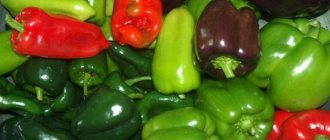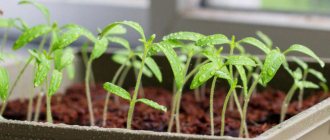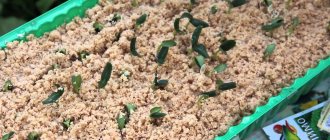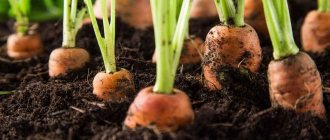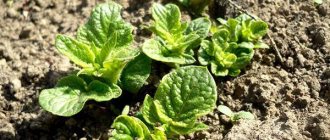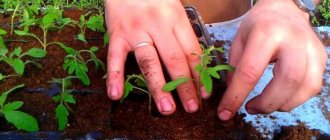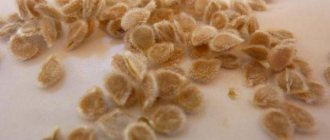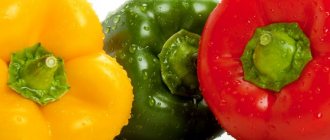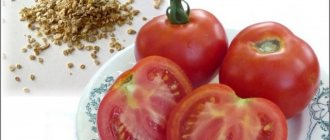Germination time of seeds of different crops
Don’t be upset if your crops don’t sprout for a long time. Perhaps a particular plant has a long germination period. Knowing the approximate timing of germination of various crops helps to obtain good seedlings.
| Culture | When they sprout / day | |
| Fast germination | peas, beans | 5-7 |
| corn | ||
| radish, radish | ||
| Average germination | cucumber | 8-10 |
| beet | ||
| eggplant | ||
| carrot | ||
| tomato | ||
| cabbage | ||
| zucchini, pumpkin | ||
| Long germination | watermelon | 11-15 |
| onion | ||
| parsley | ||
| pepper | ||
| dill | ||
Common reasons why seeds do not germinate and what to do
Many factors influence seed germination. Taking them into account, you can achieve good germination rates and the uniform appearance of seedlings.
Shelf life of seeds
When purchasing seed material, it is important to pay attention to its expiration date. With long-term storage, the likelihood of germination gradually decreases. Accordingly, a lower percentage of seedlings should be expected.
The shelf life differs for different crops and varieties. There are plants, for example, melons, whose seeds can be sown for 8 years. Nightshades, root vegetables and cucumbers can withstand several years of storage.
ON A NOTE. It is important to sow old seeds for rare varieties if it is not possible to find fresh ones. However, you need to remember that germination will not be complete.
Incorrect storage conditions
It is important to store seed material purchased or collected yourself correctly.
- It is not recommended to keep seeds in tight plastic bags that do not allow air to pass through.
- The humidity in the storage area should be low.
- Seeds should be kept in a dark, dry place.
- It is better to pour the collected seeds into thick paper envelopes.
Quality of soil used
The choice of soil for growing seedlings requires special attention. Do not use heavy loamy soil. The soil should be light, loose, nutritious, treated against possible diseases, and with good drainage properties.
Violation of sowing rules
Seeds of different crops are sown in accordance with the requirements of a particular variety. Please note:
- size and absence of damage to the grain itself;
- recommended planting depth;
- Light requirement during germination.
Watering mode
Water is necessary for the germination of any seeds. They germinate very poorly in dry soil. The soil must be moistened before sowing and not allowed to dry out in the future.
ON A NOTE. It is important not to allow the soil to become waterlogged. Excess moisture can lead to rotting of the sprouts and the appearance of mold.
Disturbed temperature regime
Seeds of heat-loving crops germinate at higher temperatures. Cold-resistant plants can germinate at relatively low temperatures.
For example, Bulgarian sprouts well if conditions are created with a temperature of at least 25°C, and carrots and beets sprout well even at +10°C.
Inappropriate temperature inhibits the vegetative processes occurring in the plant and inhibits their germination.
Sowing untreated seeds
Pre-sowing treatment of grains with disinfectants and stimulating agents allows for more uniform and complete germination. The procedure also protects seedlings from possible diseases and stimulates the processes involved in its development.
Today you can purchase planting material that has already been processed. The packages contain all the necessary information. Such seeds can be planted immediately.
Seeds take a very long time to germinate
Seeds of different crops germinate differently. Terms vary from several days to 2 weeks.
Many flowers take longer to germinate than vegetables. To avoid unfounded worries, it is advisable to familiarize yourself with the characteristics of the selected vegetable or flower crop in advance.
Failure to comply with lighting conditions
How quickly crops sprout is affected by lighting conditions. There are plants that sprout only in the light. Some crops, on the contrary, require complete darkness to germinate.
It is advisable to familiarize yourself with the germination requirements for the selected crop in advance.
Wrong day to sow
If you plant without paying attention to the recommendations of the lunar calendar, the seeds will take a very long time to sprout, and some of them will not appear at all. To obtain strong seedlings, it is better to plant on favorable days.
What determines the germination time of seeds?
From the production date: seeds harvested last summer, if all conditions are met, will sprout in 4 days, and those collected 3 years ago, under the same conditions, in 7 - 10 days.- From the variety: unpretentious, ordinary varieties germinate much faster than, for example, hybrid varieties, which are quite capricious.
- From pre-treatment: dry seeds thrown into the ground will begin to hatch only after 10 days, but pre-soaked in warm water and treated with special solutions - after 4 - 5 days.
- From temperature: the ideal temperature for germination is considered to be +23C – +25C. At this temperature, seedlings usually appear on days 5–7. But if the temperature in the room where the containers are located is significantly lower, then they will have to wait much longer.
- From the planting depth: naturally, seeds lightly sprinkled with soil will hatch to the surface much faster than those covered with a thick layer of substrate.
- From the soil: It is much more difficult for fragile sprouts to break through hard, compressed soil. It is advisable to add components to the substrate that make the soil loose and light: peat, sand, sphagnum moss, humus, vermiculite, etc.
- From the light: any sprouts always reach towards the sun. If the seeds do not have enough light, they will “sit” in the soil for a long time without showing signs of life. Therefore, seeds are often sown in transparent plastic containers and immediately placed in a sunny place or under artificial lighting.
- From soil disinfection: the soil may contain fungi and bacteria, pathogens of infectious diseases. In this case, the seeds may die at the germination stage.
You can plant expired seeds that have expired
Seeds have a period during which they germinate as well and amicably as possible. The shelf life of planting material varies among crops.
If necessary, you can try to grow seedlings from expired seeds.
Experts recommend conducting a test landing. To do this, you need to take 5-6 seeds and check them for germination. If none of them have sprouted, then you shouldn’t plant them.
It is advisable to purchase fresh planting material every year. More friendly and strong seedlings grow from it. It is recommended to use old seeds only to preserve the variety you like.
After how many days do shoots appear?
Every gardener needs to know the germination time of pepper seeds. This will help to correctly calculate the timing of sowing seeds for seedlings and transplanting them to a permanent place. In addition, this will allow the summer resident not to worry about the seeds germinating too slowly and to make sure that the crops are properly cared for.
How many days does it take for pepper seeds to germinate?
- untreated – after 6-15 days;
- pre-treated – after 5-6 days;
- with dry sowing - after 8-9 days.
Pre-treatment of pepper seeds includes disinfection, soaking in stimulants and germination. It helps speed up the germination of pepper grains for 7-8 days, making the sprouts stronger and more viable.
Bell pepper seeds retain good germination capacity for 3-4 years, after which it rapidly declines. The best germination can be obtained by sowing grains no more than 1 year old. Therefore, when preparing seed material, it is worth considering its age.
How does pre-treatment of seeds before sowing affect germination?
Pre-treatment before planting has many advantages:
- sprouts sprout evenly;
- increased resistance to diseases and pests;
- reduction of barren flowers;
- stronger and healthier seedlings.
There are several ways to process and prepare grains for planting.
- Warming up has a good effect on the germination of self-collected seeds.
- Calibration allows you to select the best specimens.
- Testing for germination gives confidence in the quality of crops when sowing large areas.
- Disinfection of planting material can be carried out with a solution of manganese, Fitosporin or garlic tincture.
- Pre-soaking is used for relatively large seeds. It stimulates rapid germination and growth of seedlings.
- Hardening is carried out at low temperatures. It increases the stress resistance of future seedlings.
How to stimulate seed growth
Natural stimulants will speed up seed germination: − aloe juice;
− succinic acid; − chicken egg; − ash water. The easiest way to stimulate the seed is to keep it for 6-8 hours in the Energen solution: 5 drops per 1 glass of water.
You can reduce the germination time by keeping the seeds in a humid environment before planting - wrapping them in a wet cotton napkin and placing them in a container. Germination is preceded by swelling, the seed is saturated with water and awakens to life. As soon as the grains hatch, they are immediately planted in the soil. They do this carefully, trying not to damage the fragile sprout.
Germination also depends on the depth of planting. Small seeds need light to germinate, so they are only lightly sprinkled with soil. Some seeds require stratification - keeping them at a low temperature for 1-2 months.
Moisture and cold lead to the growth of the embryo, softening and cracking of the shell. For rapid germination, the planting product in a hard shell is subjected to scarification, that is, the top layer is destroyed by sawing or piercing.
The most common reasons for non-germination of different crops, table
| Factors | Culture |
| low temperature | watermelon melon pumpkin pepper |
| Fever | roots greenery cabbage |
| Burying the seeds | annual flowers perennial flowers greenery |
| Surface landing | cabbage legumes cucumber onion |
Is it possible to influence the germination of already planted seeds?
If seedlings do not sprout for a long time, this is not a reason to be upset. There are proven methods to activate their germination.
- Create a greenhouse effect by covering the container with glass or transparent polyethylene.
- Organize a sharp temperature change for 1.5-2 hours by moving the containers to the balcony or taking them outside.
- Treat the soil with growth stimulants. Succinic acid has proven itself well.
- Place the container with future seedlings under the light of a UV lamp for 12 hours.
Common mistakes
When germinating seedlings, inexperienced gardeners can make serious mistakes that reduce the likelihood of good germination.
- Deepening of planting material that does not meet the requirements of the variety.
- Excessive soil moisture or drying out.
- High or low air temperature.
- Using heavy soil with poor drainage properties.
- Using untreated seeds.
- Sowing seeds that have expired.
- Planting damaged or uncalibrated seed.
- Sowing seeds after storage in unsuitable conditions.
The first reason is poor seed quality
The most important cause of problems with seedlings is low seed quality. I've said this many times: don't skimp on seed. Yes, seeds from leading companies are more expensive than seeds from little-known producers, but serious enterprises that have long established themselves in the market value their reputation, control the quality of their products and supply only high-quality, professionally processed seeds for sale.
From year to year we buy expensive seeds from certain companies and do not regret it. Seed quality is especially important if you are growing vegetables or flowers commercially.
Answers to frequently asked questions
In what month can you start planting seedlings?
Answer: The earliest planting dates are at the end of January - beginning of February. Sowing time depends on the specific variety. It is important to carefully study the instructions on the packaging before planting.
How often should I water the planted seeds so that they sprout better?
Answer: After sowing, watering is carried out only if the soil dries out. To water less often, you can create a mini greenhouse.
Do planted seeds need additional lighting?
Answer: The need for light varies by culture. Not all plants germinate in the light.
Are there standard rules for burying seeds in the soil?
Answer: Planting depth depends on the type of plant. It is generally accepted that seeds need to be planted at 3 times their thickness. Then they will rise evenly.
How can soil quality affect germination?
Answer: The quality of seedlings directly depends on the soil. The plant cannot hatch in heavy soil. Dry, crusty soil also interferes with germination. Soil that does not drain moisture well can cause seed rot.
Reason two – low humidity
The second reason for poor seedlings is insufficient humidity. I will illustrate this thesis using the example of tomato seeds, although this applies to sowing any crops.
- Shallots: growing in the garden from seeds
The main reserve substance in tomato seeds is protein. After sowing, it should absorb an amount of moisture that is approximately three times the weight of the seed. When the protein is saturated with moisture, the seed will swell and open, releasing a sprout. This is why it is recommended to soak the seeds before sowing. Therefore, immediately after sowing, you need to moisten the soil and regularly monitor its moisture level in the following days.
